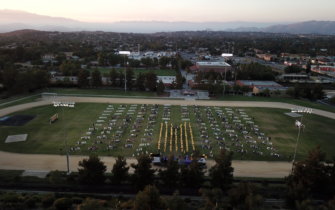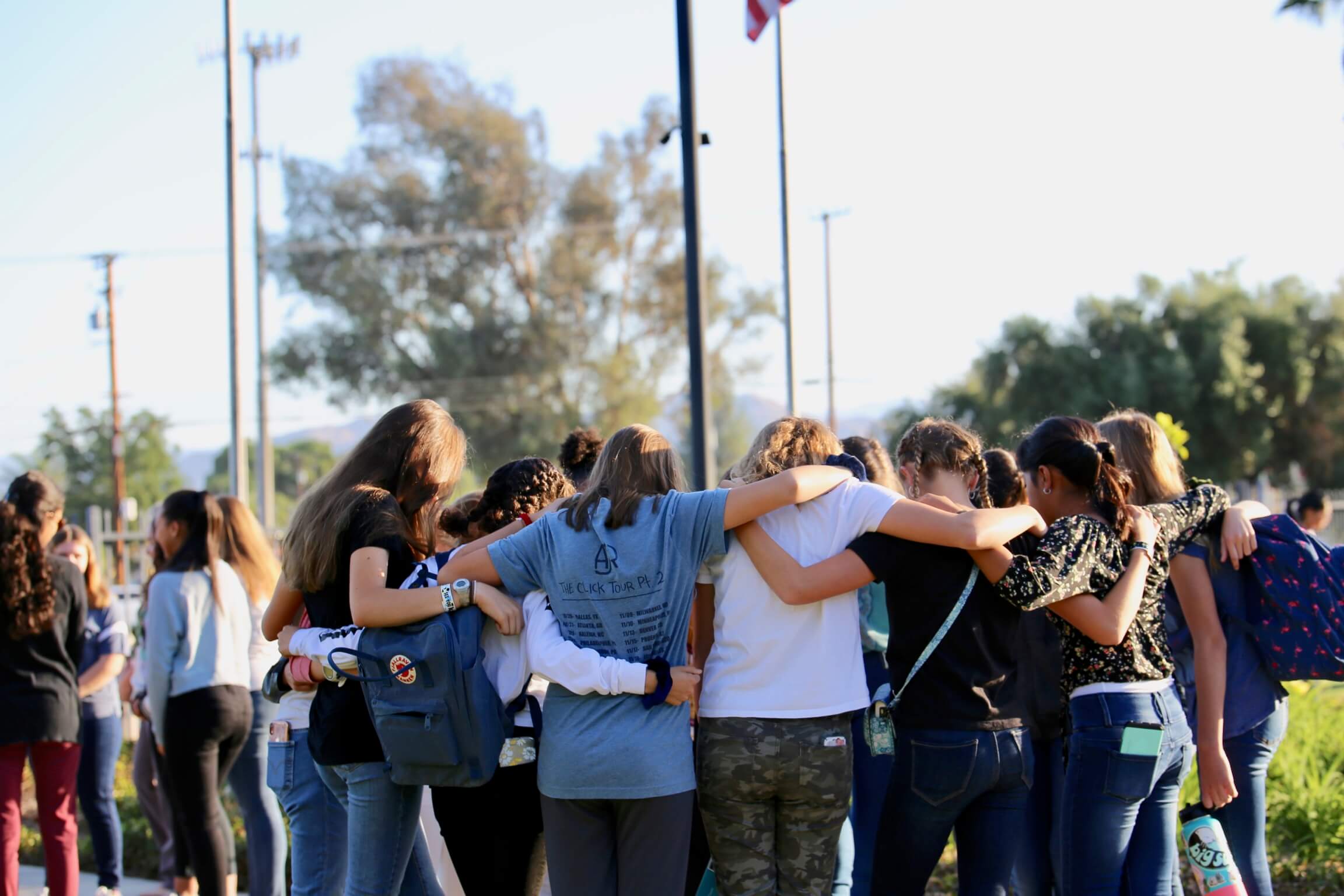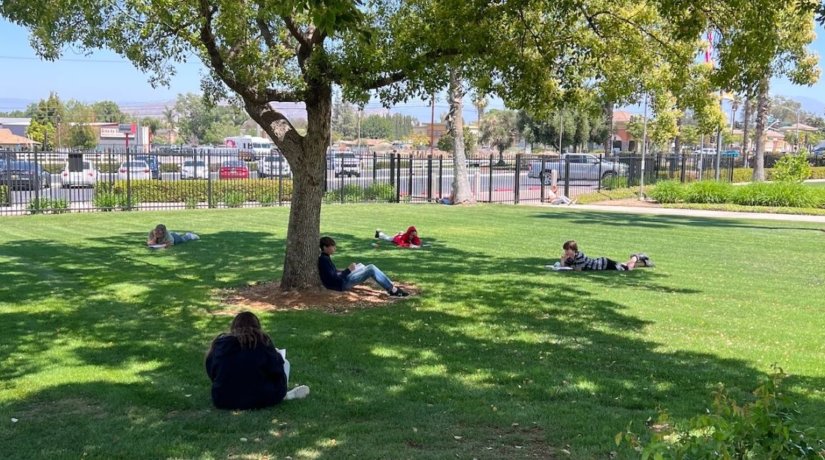By Andrea Burns, WCMS Bible Teacher
It was a lovely afternoon–my 7th grade students had the opportunity to have Bible class outside. They were directed to find a place to sit in solitude before the Lord. With their Bibles, journals and reflection questions in hand, they were given time to pray and reflect, confess their sins, and enjoy some rare moments in silence.
After returning to the classroom from this peaceful experience, a student sat down, sighed, and said, “Wow . . . I needed that.” His soul was refreshed from simply being outside and alone with the Lord without distractions, devices, and other people. Alone, quiet time with the Lord– it’s hard to come by these days, but does it have to be?
It didn’t take me long to learn the extreme busyness of my students and their families, and it was the same busyness I grew up with. And it makes sense–each kid is involved in a different activity which takes you to upwards of three different locations in any given evening to allow them awesome opportunities to improve on their God given skills and/or offer them new experiences.
We always want to focus on the whole child and not simply academics–extracurricular activities are good for them. But as we focus on the development of the whole child I think we often forget to teach them and give them opportunities to rest, and for Christians, the rest we find in the Lord.
This rest, this break from the busy, allows them time to process the competition that didn’t go well, the quiz they failed because they were up too late because of practice, the arguments with a friend, parent, or sibling, the hard that simply comes through living. It’s rest that needs to be taught.
So how often do we schedule time of silence and solitude with the Lord? Do we model it for our children? If as parents we don’t get the time ourselves, how can we set a good example? Do we make a practice of time away from our phones if it’s something we want to see our kids doing? We all know that quiet alone time most often doesn’t happen without planning for it. What would it look like for our children to get in the habit of silence and solitude when they are young? Donald Whitney in his book Spiritual Disciplines for the Christian Life says, “More than any generation in history we must discipline ourselves to enjoy the blessings of silence and solitude.”
“More than any generation in history we must discipline ourselves to enjoy the blessings of silence and solitude.” – Donald Whitney, author of Spiritual Disciplines for the Christian Life
We must train the habits we want to see formed in our children. If we want to see them regularly off their devices and taking quiet times away for prayer and reflection, it must be trained.
If we want to see them becoming godly young men and women, it needs to be trained for we know our culture isn’t going to lead them this way. Training takes time and practice. When training for a marathon, you don’t start by running the full 26.2 miles; you train slowly– gradually adding miles as you gain endurance. It’s the same with spiritual disciplines.
Just like the discipline with running–if your goal is to read the Bible everyday and you’re not currently reading it at all, create a manageable goal. Start by adding a time or two a week, then once you’re consistent with that add more and more. The goal of spiritual disciplines should be to become more like Christ. 1 Timothy 4:7-10 says,
“Rather train yourself for godliness; 8 for while bodily training is of some value, godliness is of value in every way, as it holds promise for the present life and also for the life to come. 9 The saying is trustworthy and deserving of full acceptance. 10 For to this end we toil and strive, because we have our hope set on the living God, who is the Savior of all people, especially of those who believe.”
The command here to train for godliness is not a passive suggestion–it’s a direct imperative. Godliness is of value in every way; our time spent with the Lord will never be wasted. Whitney says, “The goal of practicing a given Discipline, of course, is not about doing as much as it is about being, that is, being like Jesus.” So, families, be like Jesus; do what he did and teach your children to do that same.
We see several times throughout the gospels that Jesus took time away for prayer and solitude. Here are a few reasons we should do the same:
- To Follow Jesus’ Example- Luke 4:42 says, “When it was day, he departed and went into a desolate place. And the people sought him and came to him, and would have kept him from leaving them.” Simply put, Jesus stepped away from the crowds to be alone with his Father (Matthew 14:23) and he woke early to pray (Mark 1:35); so to be like Jesus, we need to do what he did. This was clearly a discipline he knew to be important.
- To Be Physically and Spiritually Restored- Whether we like it or not, God made us limited beings and our bodies and souls need rest. As much as I love to unwind on the couch with my favorite movie and snack, that does not give rest or encouragement to my soul. Our bodies need time to rest from the stress and demands of our busy schedules, but we can’t negate times of worship with God that can come in the quiet and stillness of our souls. Whitney says, “There are times to speak to God, and there are times to simply behold and adore him in silence,” and as Zephaniah 1:7 says, “Be silent before the Lord.”
- To Worship Without Distractions- Although the Bible doesn’t command that our times of prayer and worship to God always need to be silent and alone, there are times when it helps to eliminate the voices of the world in order to worship without distractions. Isaiah 30:15 says, “in quietness and in trust shall be your strength.”
If we desire for our children to hear from God and to “set [their] minds on things that are above, not things that are on earth” (Colossians 3:2) then we need to help train them to do so.
Here are some ways you can start this training this summer.
- “Minute retreats”- Redeem quiet moments throughout the day that can provide a quick encouragement and enjoyment of the Lord. This can be at a traffic light, a Starbucks drive thru, a line at an amusement park. Use these moments to pray for someone who may be hurting, praise God for an unexpected joy, or simply acknowledge a character trait of God’s and thank him for it.
- Daily silence and solitude- Schedule a daily time for your kids and for yourself. “Rest time”, “alone time”, “quiet time”–whatever you want to call it– schedule it in and set up the expectations as to what you want this time to look like. If this is new for your family, start with a shorter time and then eventually lengthen it. This is a great time for reading something with the goal of spiritual encouragement, listening to worship songs, and time for journaling.
- Getting away- Plan for a longer time of solitude– a couple hours (or more!) alone at the beach or at the lake, or simply alone in a room at your house. Plan how to use this time– evaluate, plan for the coming school year, make goals, read, and pray.
- Special places- Find a secluded spot to spend regular time with the Lord where you can achieve both internal and external silence. Make this a sacred space to meet with God.
“I needed that . . .” After I spend these quiet moments with the Lord, this, too, is typically my response. I have never regretted time spent with the Lord, even the short quiet moments.
As a Bible teacher, I also want to have this lens for my students and do better with providing them these quiet moments throughout their day. I want to remember that sign of relief from a student that had been feeling so overwhelmed and stressed about all that was on his plate.
Yes, I desire for them to be filled with the amazing truths the Bible has to offer, but knowledge without time for their hearts to be convicted or connected will just stay knowledge. This is a challenge for me as I seek to teach your children intellectually as well as find ways to help them grow in their spiritual relationship with the Lord.
I pray that as your family seeks to implement these times of silence and solitude that you begin to long for these times of deep soul rest. As we train ourselves and our children to rest in the Lord and be quiet before him, amazing transformation can happen!
I fully believe that in these times their relationship with the Lord will strengthen as they learn to hear from their Savior instead of the loud voices of the world. Families, commit to these practices. Be determined to push into the silence and wait patiently for the good fruit that comes when we wait on the Lord. “The Lord is good to those who wait for him, to the soul who seeks him. It is good that one should wait quietly for the salvation of the Lord.” (Lamentations 3:25-26)
















